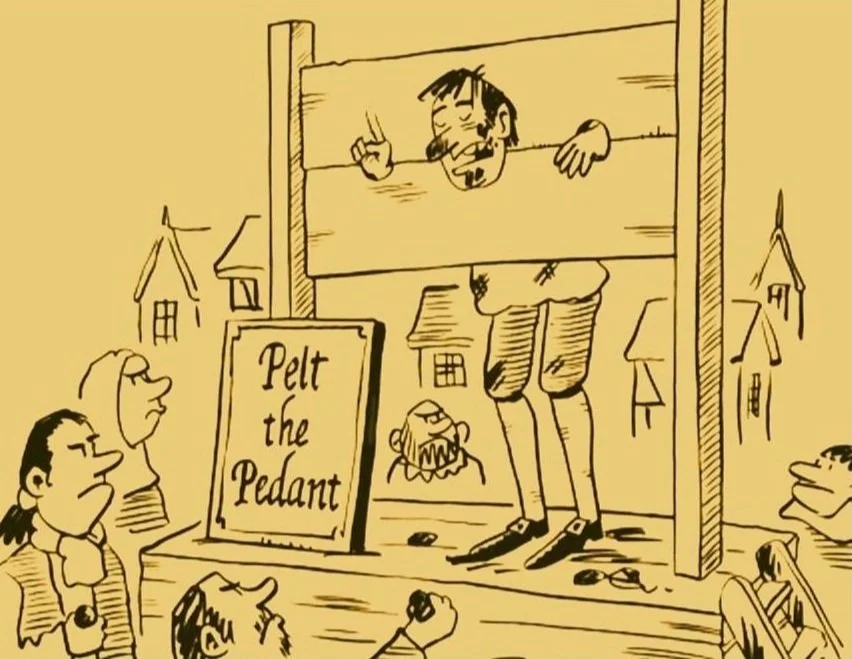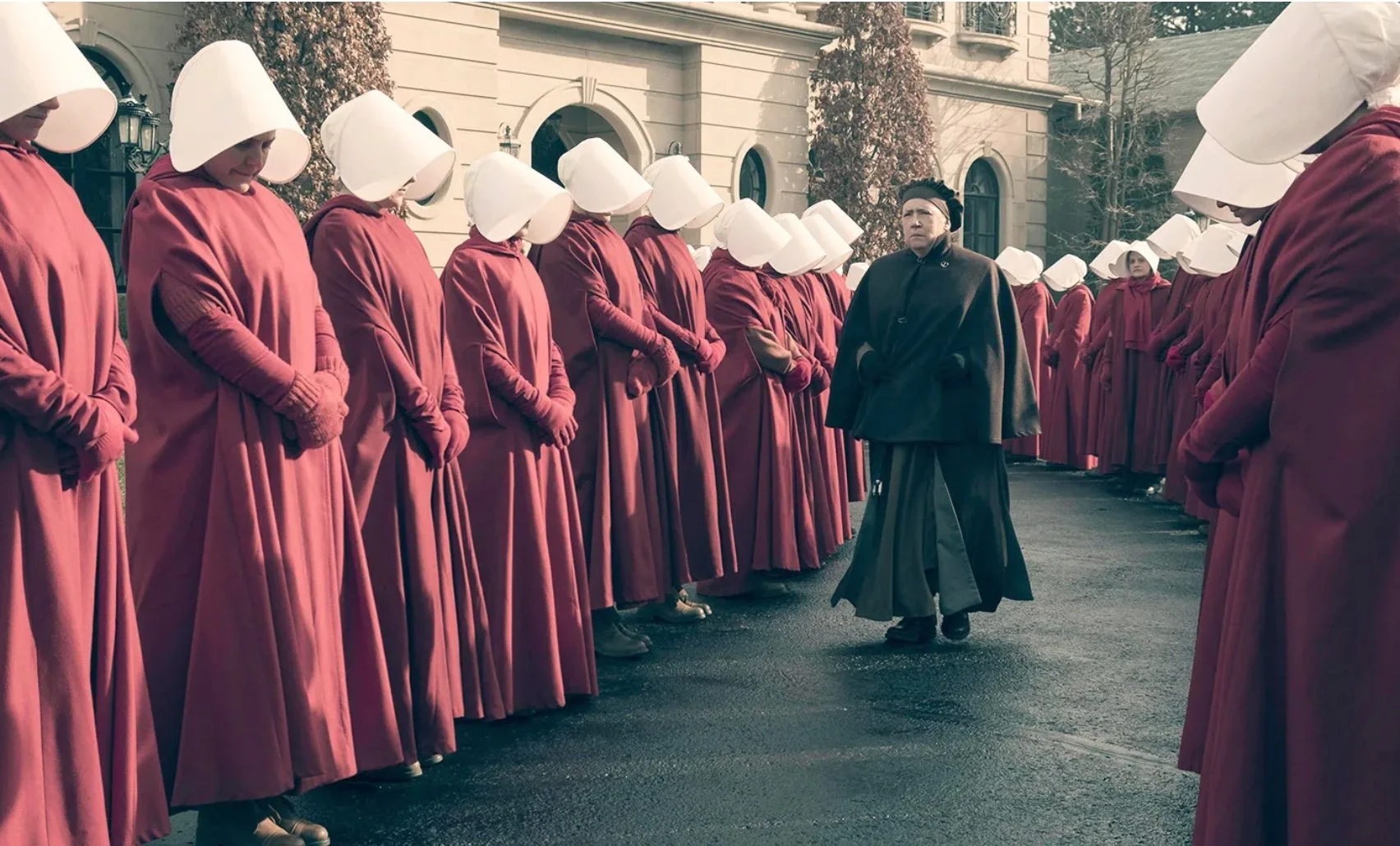By The Landlord
“Shame is a soul-eating emotion.” – Carl Jung
“Whatever is begun in anger ends in shame.” – Benjamin Franklin
“I never wonder to see men wicked, but I often wonder to see them not ashamed.” – Jonathan Swift
“A man must not be without shame, for the shame of being without shame is shamelessness indeed.” – Mencius
“The only shame is to have none.” – Blaise Pascal
Do you ever get shame-related fantasies? I’ve had some recently, as a pent-up expression of my frustrations about the world, about everyone from the local idiots who throw trash out of their cars or fly-tip discarded fridges and dusty TV tables on our street corner, to all those corrupt in power – the profit-grabbing industrial polluters and the politicians who help facilitate it, all of those who seem to have no shame. It might hark to a more brutal time, but wouldn't it be fun to briefly bring back the stocks (feet), or pillory (head and hands) for those people? Imagine, for example, the likes of a Boris Johnson or a Donald Trump, and many others, in the stocks, sitting in nothing but their pants, being pelted with rotten eggs and tomatoes.
Or indeed, if you want to ramp it up a bit, what about a public walk of shame for such people, as dramatised in George RR Martin's Game of Thrones, in which the cruel and corrupt Queen Cersei is o'er-leapt by her own ambitious scheming, having allowed religious zealots to destroy her rivals, before being herself pounced on them, and being forced, after confessing her sexual shame (cousin shagging?) to stagger through the streets of King's Landing completely starkers to the sound of a tolling bell and a shame-shouting nun, before the mob embellish the punishment with spit and rotten food. Horribly spectacular and shamefully satisfying. Here’s a clip and some explanation:
So then, this week it's all about shame. Firstly though, let's distinguish that with the overlapping feeling of embarrassment, a former topic and simpler sub-form, that feeling of self-consciousness in front of others, something that's more often fleeting than shame.
Yet shame is something far more complex, deep-rooted, often hidden and long-lasting. Subjective and tangible and yet hard to express, is defined as a painful feeling of humiliation or distress caused by the consciousness of wrong or foolish behaviour, as well as being a discrete emotion fulled by moral or social norms, that drives people to hide or deny their wrongdoings.
There's a lot going on there. Shame is arguably a necessary but sometimes harmful part of social behaviour. Often it's those who possess shame that could do with less of it, and those who have none could do with more of it. Shame stems from morality, religion, law, and family upbringing, as an emotional byproduct of what's regarded as right and wrong. Perhaps there are good and bad, healthy and harmful forms. Shame might come from so many things - upbringing, education, sexuality, experience. And it's this and so much more that makes it a rich topic for songs, repression into expression.
How might shame manifest itself physically? Charles Darwin described it, not only in humans, but also mammal cousins, as blushing, confusion of mind, downward cast eyes, slack posture, and lowered head. Can animals feel or show shame? Perhaps, such as when your dog or cat has bitten, clawed, or done a poo somewhere inappropriate, but I think it's most us humans that have cause to blush. And those physical expressions are also signs that might come up in song lyrics.
The great Jonathan Swift, author of Gulliver's Travels, and quoted above, potently used human-animal shame in the last part of that great book, in which Gulliver finds himself on the Land of the Houyhnhnms, a race of morally superior talking horses, while he is regarded as a hairy form of naked ape, known as Yahoo, though is accepted by them. But after such an elevated experience, when Gulliver finally returns to his homeland, he feels nothing but shame at the sight and smell of his fellow humans. It’s truly biting satire on human behaviour and might even be snipe at slavery too.
Illustration of a herd of hairy human-like Yahoos driven by the superior horse race of Houyhnhnms in Gulliver’s Travels
Meanwhile, here's George Eliot on the deep-seated form of human shame in Middlemarch:
“The terror of being judged sharpens the memory: it sends an inevitable glare over that long-unvisited past which has been habitually recalled only in general phrases. Even without memory, the life is bound into one by a zone of dependence in growth and decay; but intense memory forces a man to own his blameworthy past. With memory set smarting like a reopened wound, a man’s past is not simply a dead history, an outworn preparation of the present: it is not a repented error shaken loose from the life: it is a still quivering part of himself, bringing shudders and bitter flavors and the tinglings of a merited shame.”
Following up from Carl Jung's remark above, James Hollis writes, in his book, Hauntings: Dispelling the Ghosts Who Run Our Lives, how “Jung observed that everyone has a pathological secret, something so scary, so shameful perhaps, so humiliating, that one will protect it nearly any cost.”
Philosophers from Immanuel Kant to Bernard Williams have continually argued whether or not shame comes from others or oneself. It's probably both, internal or external, from that's personal feelings of disappointment, of falling short, to deeper narcissism, hidden guilt, to public stigma or guilt brought about by others, or toxic shame brought about by deep-rooted childhood experience such as abuse.
As usual, there are further guests in the Bar willing to talk about it. Shame can be a seen in the macro- or microcosm, as a perspective of history, or of the personal and private.
But where to start? On both fronts, Benjamin Franklin's still here and sees one of the biggest sources of shame as poverty. “Having been poor is no shame, but being ashamed of it, is,” he declares.
And in Charles Dickens' masterpiece, Great Expectations, Pip is ashamed of his poor upbringing, longing to aspire to the higher society, and yet later feels shame of betraying his roots. “Heaven knows we need never be ashamed of our tears, for they are rain upon the blinding dust of earth, overlying our hard hearts.”
But getting away from those personal perspectives, the charismatic and entertaining Bishop Desmond Tutu in livening up the house, but makes the serious point that "in its history, Europe has committed so many massacres and horrors that it should bow its own head in shame."
History is draped in political shame, but in narratives in song may also cover shame even more often with personal experience. American social science professor Brené Brown, who specialises in the subjects of shame and vulnerability tells us that: “Men walk this tightrope where any sign of weakness elicits shame, and so they're afraid to make themselves vulnerable for fear of looking weak.”
She also writes: “Shame corrodes the very part of us that believes we are capable of change.”
Shame is a many-sided entity and works different directions. And female perspective may be more potent than most, women having oppressed and controlled all sorts of shame, physical and psychological.
At its most extreme Margaret Atwood portrays this in The Handmaid’s Tale, the harrowing tale of a fictitious dystopian American state of extreme Old Testament-style religious extremism, with real-life parallels, in which main character Offred is forced to bear children under a violent regime of oppression and shame. “I would like to be without shame. I would like to be shameless. I would like to be ignorant. Then I would not know how ignorant I was.”
The Handmaid’s Tale: a stark story of society driven by religious and sexual shame
By huge contrast, Dolly Parton's a very up-front sort of person, and returns to the Bar with her effervescent charisma. She has expressed all sorts stories of shame in her songwriting. “I think so many people live their whole life in fear and doubt and shame,” she says.
Another brilliant songwriter, Fiona Apple, is also here, and tells us that: "The worst pain in the world is shame. I spend a lot of time trying to not do anything bad to anyone, but you can't live your life and not hurt people."
Fiona's lyrics are all about dealing with relationship and personal difficulties but inverts this with another comment: "Men are my bread and butter. It's what I live for! I have no shame about that."
But there are also examples where shame might take an even more destructive form for those with drug or alcohol dependency. But what happens to shame in that context? Does it remain or disappear? In John Grisham's law-related thriller, the The Testament, we're told that “shame was an emotion abandoned years earlier. Addicts know no shame. You disgrace yourself so many times you become immune to it.”
But singer-songwriter Aimee Mann tells us that "you take drugs and it does something to your brain and then you can't stop. It's easier to describe that shame, that horrible feeling of not being able to control your own life."
We started with the stocks, so let's finish with them and perhaps on a less serious note. Shame may come from within oneself or from others. The modern equivalent of the stocks are the pillories of social media, public shaming on Twitter and other platforms. I've no wish to get involved in any other that, but one of the more entertaining inversions of that shame and guilt format comes in the form of Twitter feed Fesshole, a creation from the fiendish mind of longtime internet obsessive Rob Manuel, in which readers anonymously submit dark confessions of shameful, bitchy, but arguably amusing behaviour. There's an endless supply but here are a couple of music-related examples.
"If I'm bored at social occasions, I'll start introducing myself as having been the bassist in Starsailor. Nobody remembers what they looked like, so it's believable, and then make up stories about the lead singer ..."
"I look fairly like Ed Sheeran, I can't stand the man or his music, so I enjoy putting on similar clothes to him and being obnoxious at public events, or ostentatiously browse/buy niche porn at motorway service stations in the hope it lowers his reputation."
Fesshole: a portal of entertaining shame
Shameless! Or shameful? You decide. So then, it's time to submit your own shame-related songs below. This week, I'm delighted to reveal that weighing up the moral or otherwise potency of your offerings in the musical confessional is the wise and sensitive DiscoMonster! Deadline for submissions is 11pm UK time on Monday, for playlists published next week.
New to comment? It is quick and easy. You just need to login to Disqus once. All is explained in About/FAQs ...
Fancy a turn behind the pumps at The Song Bar? Care to choose a playlist from songs nominated and write something about it? Then feel free to contact The Song Bar here, or try the usual email address. Also please follow us social media: Song Bar Twitter, Song Bar Facebook. Song Bar YouTube, and Song Bar Instagram. Please subscribe, follow and share.
Song Bar is non-profit and is simply about sharing great music. We don’t do clickbait or advertisements. Please make any donation to help keep the Bar running:




